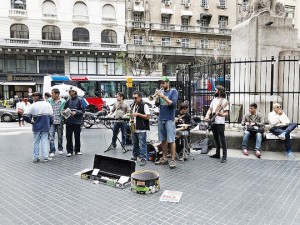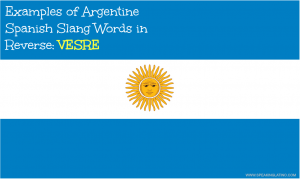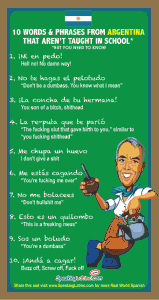Money is an important topic in Argentina, more so than other countries. With its yo-yo economy, high inflation, corrupt system and long-term monetary and debt problems, it is a daily topic of conversation for everyone. As someone employed for a short time by the much-hated (in Argentina) International Monetary Fund (IMF) I love hopping into […]
3 Tips to Improve your Argentina Spanish Grammar
As with other local Spanish languages, Argentine Spanish includes some deviations from typical Spanish grammar. These rules will help you begin to better understand Argentinians. 1. Vos: In Argentina, the tu form of verbs is not used. Instead, vos is the term that is used to mean “you”. For instance, instead of the typical Spanish […]
Reverse Lunfardo: 25 Argentina Spanish Slang Words
Spend just a short time in Argentina, or even just around Argentinians, discussing their language and you are bound to hear the word lunfardo. Don’t worry, you weren’t asleep for that part of your Spanish class. Frankly, almost nobody outside of Argentina knows what it is either. Lunfardo began as a unique slang developed by […]
Argentina Spanish Slang Word CONCHA: A Sea Shell or a Woman’s Vagina?
As mentioned in the post Puerto Rican Spanish Slang for Penis: A Bug or a Guy’s Dick?, a completely innocuous word in one country may mean something seriously crude in another. This time the word is concha which in many countries has the sole meaning “sea shell.” Above, I stand in front of the sign […]
3 Great Songs To Help You Crack the Argentinian Spanish Dialect
With these songs you will be able to listen to, learn and practice the Argentinian Spanish accent, voseo and lunfardo. Listen and watch the videos!
Argentina Spanish Clothing Words Flashcards
Every Spanish-speaking country has its own set of common words for specific topics. It is important to familiarize and know these while traveling abroad. Even if you are a native Spanish-speaker you might find some words completely new for you. Here is a list of 20 Argentina Spanish clothing words. They are presented in a […]
The Meaning of the Argentine Spanish Slang Word BOLUDO in English
Every country has a flag, food and symbols that identify them. But what about a single word? During the 6th International Congress of the Spanish Language (VI Congreso Internacional de la Lengua Española) celebrated in Panama, the blog Papeles Perdidos, created by the newspaper El País, published an atlas of the representative words of Spanish-speaking […]
VIANDAS: Argentina Spanish Slang Word
Have you ever run across the word viandas? It is generally translated “root vegetables” or “tubers,” referring to potatoes, sweet potatoes, yuca and other similar vegetables that grow underground. In Argentina, however, the meaning is completely different. The word vianda in Argentina refers to a prepared meal, a lunch or dinner box that a child […]
BOLUDO meaning in Argentina Spanish
What does boludo mean in Argentina? Dude, bro, easy, jerk, dumbass, screw around, idiot. All of them! The word ‘boludo’ in Argentina is one of the most useful and most common Spanish slang words you will learn. Argentinians are known for their hospitality, which is an integral part of their culture. From inviting guests to […]
quilombo
A term originating from Argentina, Uruguay and Paraguay, 'quilombo' is used to refer to a mess, chaos, disorder or complicated situation. It can also refer to a problem or a brothel. Examples Spanish: Este lugar es un quilombo, no se puede encontrar nada. English: This place is a mess, you can't find anything.
Argentina Blue Dollar Exchange Rate
What is the Argentina Blue Dollar? In Argentina the currency is known as the peso. This peso trades against the US Dollar and other currencies at a rate that is monitored and controlled closely by the Argentine government. This is to keep as much of the country’s dollar reserves as possible. The government currently employs […]
Argentine Slang in Reverse: VESRE
In Argentine slang the word vesre comes from the Spanish word for reverse, revés, after moving around a few letters. Just as the word vesre, other words are made by switching around letters. These words are now so common in Argentina that they may be used more than the “real” word. For this reason, it […]
10 Vulgar Spanish Slang Words and Phrases from Argentina: Infographic
Here is the second post in our series Phrases That Aren’t Taught In School. The first list was from Puerto Rico and more countries are coming soon! Feel free to share this image! You can save it here and email it to your friends or pass it around any way you invent. You can also […]
empernar
A colloquial term referring to the act of getting trapped or stuck in a situation, particularly a romantic or sexual relationship. Examples Spanish: Mi amigo está empernado con esa chica y no puede dejarla. English: My friend is stuck on that girl and can't leave her.
tajungapul
The term 'tajungapul' does not appear to be a recognized or widely used term in Spanish slang. It might be a typo, a regional term, or a specific jargon within a certain community. Please provide more context or check the spelling. Examples Spanish: Como el término 'tajungapul' no es reconocido en el argot español, no […]
face
'Face' is not a recognized slang term in Spanish. However, when translated directly, 'face' means 'cara'. In certain contexts, it could be used metaphorically to refer to someone's audacity or nerve. Examples Spanish: No puedo creer la cara de ese tipo, actuando como si no hubiera hecho nada malo. English: I can't believe the nerve […]
punga
In Argentine slang, 'punga' is a term often used to refer to a thief or someone who steals. Examples Spanish: Ten cuidado con tus pertenencias, podría haber pungas en el área. English: Be careful with your belongings, there could be thieves in the area.
re
'Re' is a Spanish slang term often used in Argentina for emphasis or to exaggerate something. The direct translation is unclear, but it can be understood as 'so', 'very' or 'really'. Examples Spanish: Estoy re cansado. English: I'm so tired.
submarino
In Spanish slang, 'submarino' literally translates to 'submarine', but it can also refer to a type of hot drink, usually hot chocolate or coffee, served with a separate shot of milk. Examples Spanish: ¿Me pasas el submarino, por favor? Está un poco frío fuera y necesito algo caliente para calentarme. English: Can you pass me […]
sucucho
A small, modest, or poor quality house or room Examples Spanish: Vivía en un sucucho que apenas tenía lo básico para sobrevivir. English: He lived in a sucucho that barely had the basics to survive.
tarro
In Spanish slang, 'tarro' is often used to refer to a person's head or their ability to remember things. It can also colloquially refer to a large beer mug. Examples Spanish: 1. ¡Usa tu tarro para recordar donde dejaste las llaves! 2. Vamos a la cantina a tomar un tarro. English: 1. Use your head […]
tortillera
A pejorative term used in some Spanish-speaking cultures to refer to a lesbian or homosexual woman. Examples Spanish: La gente del pueblo la llamaba tortillera a sus espaldas. English: The people in the town called her a 'tortillera' behind her back.
traste
In Spanish slang, 'traste' typically refers to a person who is a nuisance or a bother. It can also refer to an old and useless thing. Examples Spanish: Deja de ser un traste y ayuda a limpiar la casa. English: Stop being a nuisance and help clean the house.
viejo
In Spanish slang, 'viejo' means 'old man'. It is often used affectionately to refer to a husband, boyfriend, or good friend. Examples Spanish: Mi viejo me compró un regalo para mi cumpleaños. English: My old man bought me a gift for my birthday.
zampar
A colloquial term used in Spain meaning 'to eat quickly' or 'to devour'. Examples Spanish: Voy a zampar este bocadillo en un minuto. English: I'm going to devour this sandwich in a minute.
zapallo
In some Latin American countries, 'zapallo' is a slang term that refers to a person who is a bit clumsy, naive, or uncoordinated. It is not always used in a negative context and can be used endearingly. Examples Spanish: No seas zapallo, ten más cuidado la próxima vez. English: Don't be a squash, be more […]
zapping
Derived from the English term, 'zapping' in Spanish slang refers to the act of rapidly changing channels on the TV or skipping through different content on the internet. Examples Spanish: Estaba haciendo zapping en la televisión cuando encontré un programa interesante. English: I was channel surfing on the TV when I found an interesting show.
pucha
An interjection used to express surprise, annoyance, or frustration. Also used as a softer substitute for a curse or swear word. Mainly used in Chile and Peru. Examples Spanish: ¡Pucha! Olvidé mis llaves en casa. English: Darn! I left my keys at home.
dar bola
To pay attention to someone or to flirt with someone. Examples Spanish: No le des bola, solo quiere llamar tu atención. English: Don't pay him any attention, he just wants to get your attention.
diario
In standard Spanish, 'diario' means daily or newspaper. However, in some Latin American slang, 'diario' is used to refer to a person's significant other or girlfriend/boyfriend. Examples Spanish: ¿Vas a salir con tu diario hoy? English: Are you going out with your significant other today?











